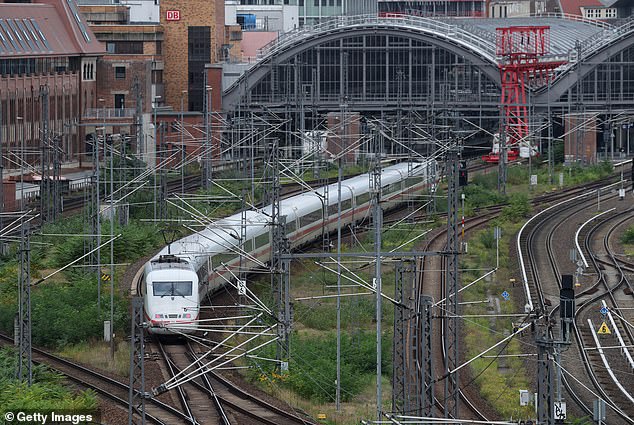German police said they are probing a possible ‘political motive’ after train cables were cut, with the country on high alert for sabotage from Russia.
Authorities revealed Monday that the cables between Cologne and Dusseldorf had been cut: ‘We discovered at around 01:15am that several cables had been cut in a cable shaft in the Rheindorf area of Leverkusen,’ a Cologne police spokesman said.
There was considerable disruption to services in the region, Cologne police added, saying that ‘a political motive cannot be excluded at this time’.
The incident occurred in the densely populated part of western Germany and caused chaos for commuters in the region on Monday morning.
Officers specialised in politically motivated crime are investigating and ‘preliminary leads have been identified’, police said.
It comes after thousands of air passengers faced chaos on Friday after hundreds of flights were delayed at Heathrow as a suspected cyber attack crippled its electronic check-in and boarding facilities.
The same strike left Brussels airport paralysed, with half of all flights being cancelled.
There were also disruptions at Berlin, Dublin and Cork – and there were warnings the turmoil could continue for days.

German authorities revealed Monday that the cables between Cologne and Dusseldorf had been cut (file photo)
As the National Cyber Security Centre – the public-facing arm of GCHQ – launched an investigation, experts blamed groups linked to Russia.
They pointed out the attack came hours after Russian jets breached NATO airspace by entering Estonia’s skies and flying over its sovereign territory for 12 minutes.
One former British military intelligence officer warned the cyber attack which has crippled Heathrow and other European airports, has ‘all the hallmarks’ of being Russian-related.
And at the beginning of the month, Russian GPS jamming was suspected of sabotaging the European Commission chief Ursula von de Leyen’s jet while it was heading to Bulgaria.
The plane carrying the EU chief was forced to land at Plovdiv using only paper maps, when a surprise interference attack suddenly disabled the GPS navigation system.
The incident was likely the result of a ‘blatant’ Russian sabotage operation, the Bulgarian authorities told the European Commission at the time.
GPS ‘jamming’ or ‘spoofing’, which disrupts access to the satellite-based navigation system, is a tactic Russia has previously used to wreak havoc with civilian life.
The technique has historically been employed by military and intelligence services to protect sensitive locations.
‘We can indeed confirm that there was GPS jamming, but the plane landed safely in Bulgaria,’ European Commission spokeswoman Arianna Podesta said.
‘We have received information from the Bulgarian authorities that they suspect that this was due to blatant interference by Russia.’
‘The whole airport area GPS went dark,’ an official brief on the incident told the Financial Times.
The pilot was forced to circle the airport for an hour before finally making the decision to land the jet manually – using only analogue maps when electronic navigational aids were disabled.
‘It was undeniable interference,’ they added.
Earlier this month, tens of thousands of people were also left without power in the capital Berlin after a fire hit electricity cables in what police labelled a suspected arson attack.
In that case, too, police said they were investigating a possible political motive after an unnamed anarchist group posted online that it had set the blaze.
Last month, three fires hit parts of the German rail network, with a far-left group calling itself the ‘Angry Birds Kommando’ saying it was behind at least one of them.
Germany has been the second-biggest supplier of aid to Ukraine after Russia’s full-scale invasion in 2022, and has accused Moscow of increasing efforts at ‘hybrid warfare’.
Last week a report co-authored by the domestic intelligence agency found that the costs to German businesses from cyberattacks and sabotage, mainly from Russia and China, topped 289 billion euros ($342 billion) over the past 12 months.
German authorities recently launched a campaign warning against Russian efforts to recruit ‘disposable agents’ via social media to carry out acts of espionage and sabotage.











